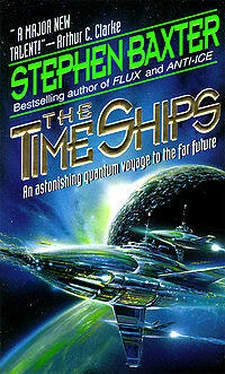“Probably not, in fact,” I remarked. “And the Juggernauts? Kitchener class, are they?”
Gibson cocked an eyebrow at me, evidently surprised at my display of this fragment of knowledge. “Actually we can barely move the ’Nauts: those wretched elephants’ feet sink into this endless mud…”
And now a clear, familiar voice called out from behind me: “I’m afraid you’re a little out of date, sir. The Kitchener class — including the dear old Raglan — has been obsolete for a number of years now…”
I turned in my chair. Approaching me was a figure dressed in a crisp Juggernaut crew beret and coverall; this soldier walked with a pronounced limp, and a hand was proffered for shaking. I took the hand; it was small but strong.
“Captain Hilary Bond,” I said, and smiled.
She looked me up and down, taking in my beard and animal-skin clothes. “You’re a little more ragged, sir, but quite unmistakable. Surprised to see me?”
“After a few doses of this time traveling, nothing much surprises me any more, Hilary!”
[9]
The Chronic Expeditionary Force
Gibson and Bond explained the purpose of the Chronic Expeditionary Force to me.
Thanks to the development of Carolinum fission piles, Britain and America had managed to achieve the production of Plattnerite in reasonable quantities soon after my escape into time. No longer did the engineers of the day have to rely on the scraps and leavings of my old workshop!
There was still a great fear that German chronic warriors were planning some sneak offensive against Britain’s past — and besides, it was known from the wreckage we had left behind in Imperial College, and other clues, that Nebogipfel and I must have traveled some tens of millions of years into the past. So a fleet of time-traveling Juggernauts was rapidly assembled, and equipped with subtle instruments which could detect the presence of Plattnerite traces (based on the radio-active origins of that substance, I was given to understand). And now this Expeditionary Force was proceeding into the past, in great leaps of five million years or more.
Its mission was nothing less than to secure the History of Britain from anachronistic attack!
When stops were made, a valiant effort was made to study the period; and to this end a number of the soldiers had been trained, albeit hastily, to act as amateur scientists: climatologists, ornithologists and the like. These fellows made rapid but effective surveys of the flora, fauna, climate and geology of the Age, and a good deal of Gibson’s daily log was given over to summarizing such observations. I saw that the soldiers, common men and women all, accepted this task with good humor and joking, as such people will, and — it seemed to me — they showed a healthy interest in the nature of the strange, Palaeocene Thames valley around them.
But at night sentries patrolled the perimeter of the encampment, and troopers with field-glasses spent a great deal of their time peering at the air, or the Sea. When engaged in these duties, the soldiers showed none of the gentle humor and curiosity which characterized their scientific or other endeavors; rather, their fear and intent was apparent in the set of their faces, and the thinness of their eyes.
This Force was here, after all, not to study flowers, but to seek Germans: time-traveling human enemies, here amid the wonders of the past.
Proud as I was of my achievements in surviving in this alien Age, it was with considerable relief that I abandoned my suit of rags and animal pelts and donned the light, comfortable Tropical kit of these time-traversing troopers. I shaved off my beard, washed — in warm, clean water, with soap! — and tucked with relish into meals of tinned soya-meat. And at night, it was with a feeling of peace and security that I lay down under a covering of canvas and mosquito netting, and with the powerful shoulders of the ’Nauts all about me.
Nebogipfel did not settle in the camp. Although our discovery by Gibson was the cause of some celebration and marveling — for our retrieval had been the primary objective of the Expedition — the Morlock soon became the object of blatant fascination among the troopers, and, I suspected, a little sly goading. So the Morlock returned to our original encampment, by the edge of the Palaeocene Sea. I did not oppose this, for I knew how eager he was to continue the construction of his time-frame — he even borrowed tools from the Expeditionary Force to facilitate this. Recalling his close shave with the Pristichampus, however, I insisted that he not stay there alone, but be accompanied either by me or an armed soldier.
As for me, after a day or two I tired of being at leisure in this busy encampment — I am not by nature an idle man — and I asked to participate in the soldiers’ chores. I soon proved my worth in sharing my painfully acquired knowledge of the local flora, fauna and surrounding geography. There was a good deal of sickness in the camp — for the soldiers had been no more prepared than I had been for the various infections of the Age — and I lent a hand assisting the camp’s solitary doctor, a rather young and perpetually exhausted naik attached to the 9th Gurkha Rifles.
After the first day I saw little of Gibson, who was consumed by the minutiae of the daily operation of his Expeditionary Force, and — to his own irritation — by a hefty load of bureaucracy, forms and reports and logs, which he was required to maintain daily: and all for the benefit of a Whitehall which would not exist for another fifty million years! I formed the impression that Gibson was restless and impatient with this timetraveling; he would, I think, have been more content if he could have resumed the bombing raids over Germany which he had led, and which he described to me with startling clarity. Hilary Bond had a deal of free time — her duties were most demanding during those periods when the great time-traveling ironclads pushed through the centuries — and she served as my, and Nebogipfel’s, host.
One day the two of us walked along the rim of the forest, close to the shore. Bond pushed her way through the thick patches of undergrowth. She limped, but her gait was blunt and forceful. She described to me the progress of the War since 1938.
“I would have thought the smashing-up of the Domes would have made an end of it,” I said. “Can’t people see — I mean, what is there to fight for after that?”
“It should have been an end of the War, you mean? Oh, no. It’s been an end to city life for a time, I imagine. Our populations have taken a fair old battering. But there are the Bunkers, of course — that’s where the War is being run from now, and where the munitions factories and so forth are mostly located. It isn’t much of a century for cities, I don’t think.”
I thought back to what I had seen of the barbarism of the countryside beyond the London Dome, and I tried to imagine permanent life in an underground Bomb Shelter: I conjured up images of hollow-eyed children scurrying through darkened tunnels, and a population reduced by fear to servility and near-savagery.
“And what of the War itself?” I asked. “The fronts — your great Siege of Europe—”
Bond shrugged. “Well, you hear a lot on the Babbles about great advances here and there: One Last Push — that sort of thing.” She lowered her voice. “But — and I don’t suppose it matters much if we discuss this here — the fliers see a bit of Europe, you know, even if it is by night and lit up by shell-fire, and word gets around. And I don’t think those trench lines have moved across an inch of mud since 1935. We’re stuck, is what we are.”
“I can no longer imagine what you’re all fighting for. The countries are all pretty much bashed up, industrially and economically. None of them can pose much of a threat to the rest, surely; and none of them can have assets left that are worth acquiring.”
Читать дальше
Конец ознакомительного отрывка
Купить книгу









